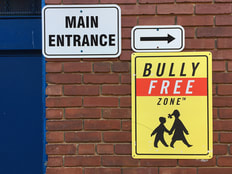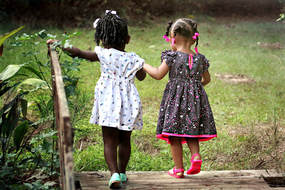 The call…”Mrs. Sanford, there has been an incident at school.” My heart sinks as I hear that my six-year old child with High-Functioning Autism has been the target of bullying by her peers. We immediately convene multiple meetings to address the issue and to ensure that this type of behavior does not happen again. In recent years, incidents of bullying in various degrees have filled our news and social media venues. In an article from 2000 (Counseling and Human Development), author Barry K. Weinhold stated that "bullying is the most common type of violence in contemporary US society". Statistics Research reveals that children with Autism Spectrum Disorder (ASD) unfortunately experience bullying even more than their neurotypical peers. For example, one study found that a total of 63% of 1,167 children with ASD had been bullied at some point in their lives (iancommunity.org). Another study found that those impacted by High-functioning Autism and/or Asperger's Syndrome were bullied more than children more significantly impacted by Autism. The Bullying-Autism Connection So, why is there a connection between Autism and bullying? 1. First, those who bully typically have been bullied themselves in some form. So, bullying others becomes a coping strategy for managing their own unresolved pain. 2. Because of theory of mind or “mind reading” challenges and social skill difficulties, our children with ASD become vulnerable targets for bullying. For example, they typically struggle to infer the intentions of others or have difficulty reading body language and other nonverbal cues. Those who bully find it easy to take advantage of these weaknesses. How Can We Help? There are several strategies to help decrease the incidence of bullying for our children with Autism.
The reality of bullying is far too familiar to families impacted by Autism Spectrum Disorder. As a clinician and Autism parent, I have experience from two perspectives. I believe that we can and we must do more to address bullying at various levels. Let's do what we can to see change for all, especially for our children with ASD 💙 References: https://www.iidc.indiana.edu/pages/bullying-and-students-on-the-autism-spectrum https://www.iancommunity.org/cs/ian_research_reports/ian_research_report_bullying https://www.autismspeaks.org/family-services/bullying https://carolgraysocialstories.com/about-2/carol-gray/
3 Comments
2/7/2018 4 Comments Autism & FriendshipsThis month our focus is on improving various relationships impacted by Autism. One example is friendships. Starting and keeping friendships for our kids with Autism can be tough. Wondering about strategies to help?
1. Embrace Solitude: If your child falls anywhere on the Autism spectrum, then you are likely aware that they tend to be happiest when they are by themselves. As neuro-typicals, this may be hard for us to accept. However, it is vital to embrace this truth early on. It will decrease frustration and anxiety as we parent our child with their unique needs by honoring their need to be alone. This does not mean that we do not actively assist them in developing healthy relationships with others. However, this should relieve just a little bit of the pressure. 2. Structured Play Groups: These are small play groups supported by trained adults. The groups include children with and without Autism. All kids have the chance to practice good friendship skills (ex: sharing, turn-taking, etc.) in a natural environment. One example of this is Circle of Friends, a nationwide "school inclusion program that builds genuine friendships between students with special needs and their general education peers". I had the pleasure of starting a Circle of Friends chapter at a local high school many years ago and have done the same at a local middle school. The benefits seen by both children with and without special needs are priceless. You may consider talking to your child's school or special education team about starting a chapter at your school. 3. Video Modeling: As most of our children have a high interest in visuals, using videos to model and teach target behaviors (ex: greetings, playing a game, etc.) is an awesome strategy. Ideally, you should catch the moment and video your child when they are using the target behavior. Watching themselves in the video definitely helps to increase engagement. However, YouTube is also a great source for these videos that model positive friendship and social skills 4. Attend Local Events: Is your child with Autism really into Thomas the Train, dinosaurs, etc? Find local. small events at your neighborhood library, park or toy store where their passion is the theme. Your child will be able to engage with their peers and they will likely shine as the expert on the topic. This setting may also increase your child's motivation to engage with their peers since the topic is highly motivating. Another bonus: As a parent you may meet other like-minded parents and develop friendships of your own. Some San Diego resources include the San Diego Children's Museum and the Autism Tree Project Foundation. Friendships for our children with Autism may take effort, however learning and practicing key skills early on in a variety of environments may reap a lifetime of benefits. References: The Complete Guide to Asperger's Syndrome (Tony Attwood), AFIRM Modules |
AuthorCrystal Sanford, M.Ed., M.A. CCC-SLP, ASDCS is an Educational Consultant, IEP & Autism Advocate and Speech-Language Pathologist. She is also the host of inspiring podcasts, Thriving Special Families and Thriving Autism Families! Her passion is advocating STRONG alongside fellow Autism and other fellow parents of neurodiverse children, helping them to persistently pursue what their children deserve at school. In her free time, she enjoys gardening and spending time with her husband and two children in San Diego, CA. Archives
November 2023
CategoriesAll Amazing Grace Autism Info IEP Advocacy SAC Company Info Thriving Special Families Tips And Strategies |
Photos from Ivan Radic (CC BY 2.0), Ben Taylor55, Oregon State University, C. VanHook (vanhookc), Rod Waddington, bobobahmat, Ivan Radic, marcoverch, Szhlopp, quinn.anya, bennylin0724, Gamma Man, Lorie Shaull, vhines200, davidstewartgets, truewonder, wuestenigel, ecosistema urbano, Phil Scoville, Our Dream Photography (Personal), Alexander king79, Dick Thomas Johnson









